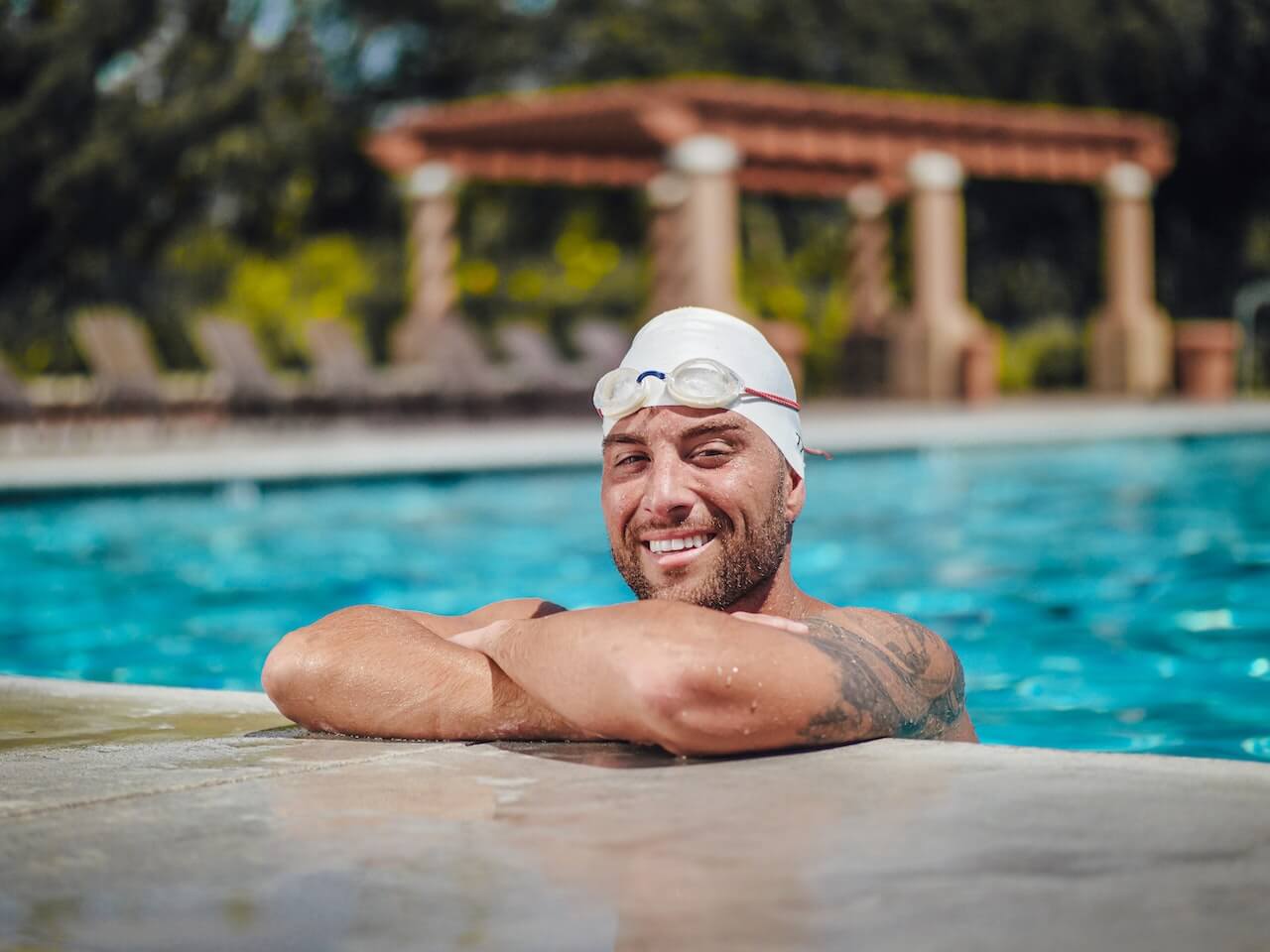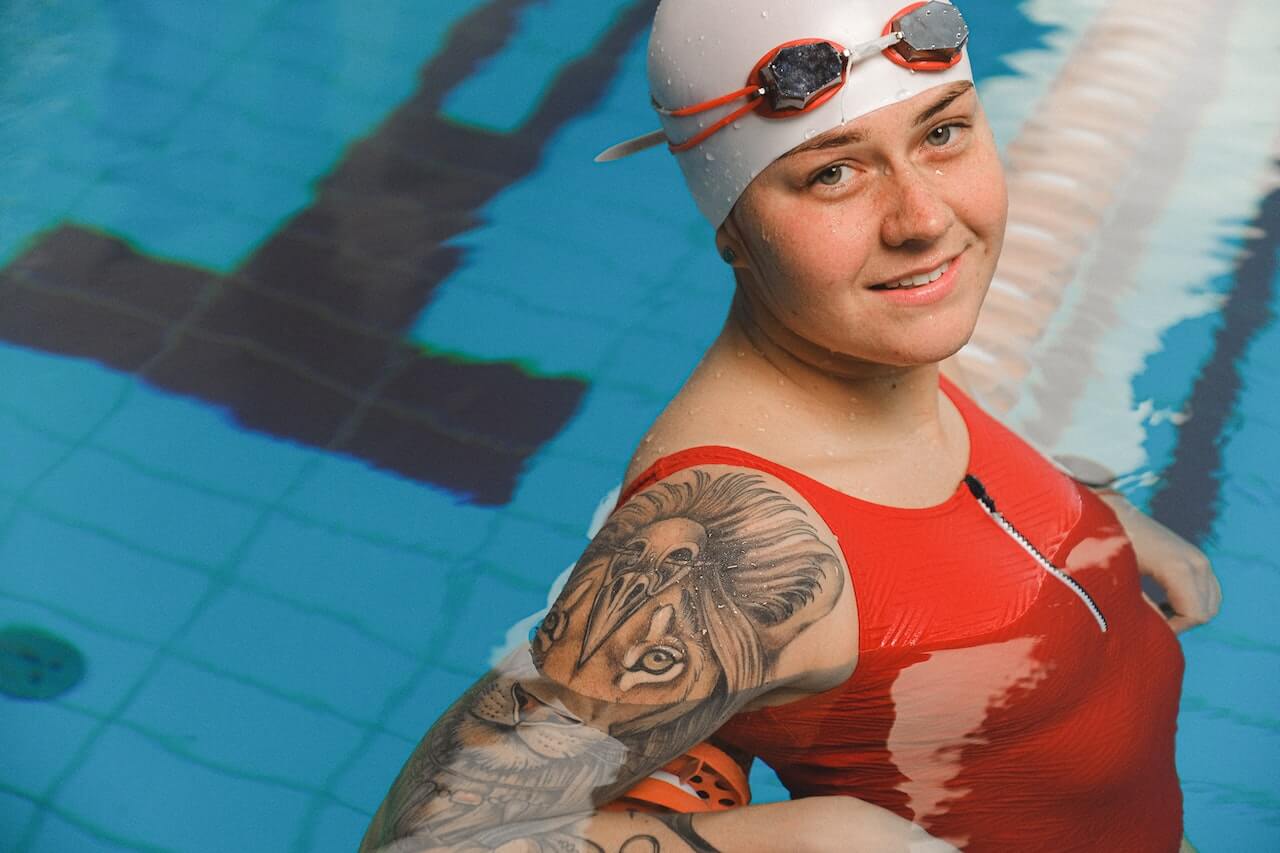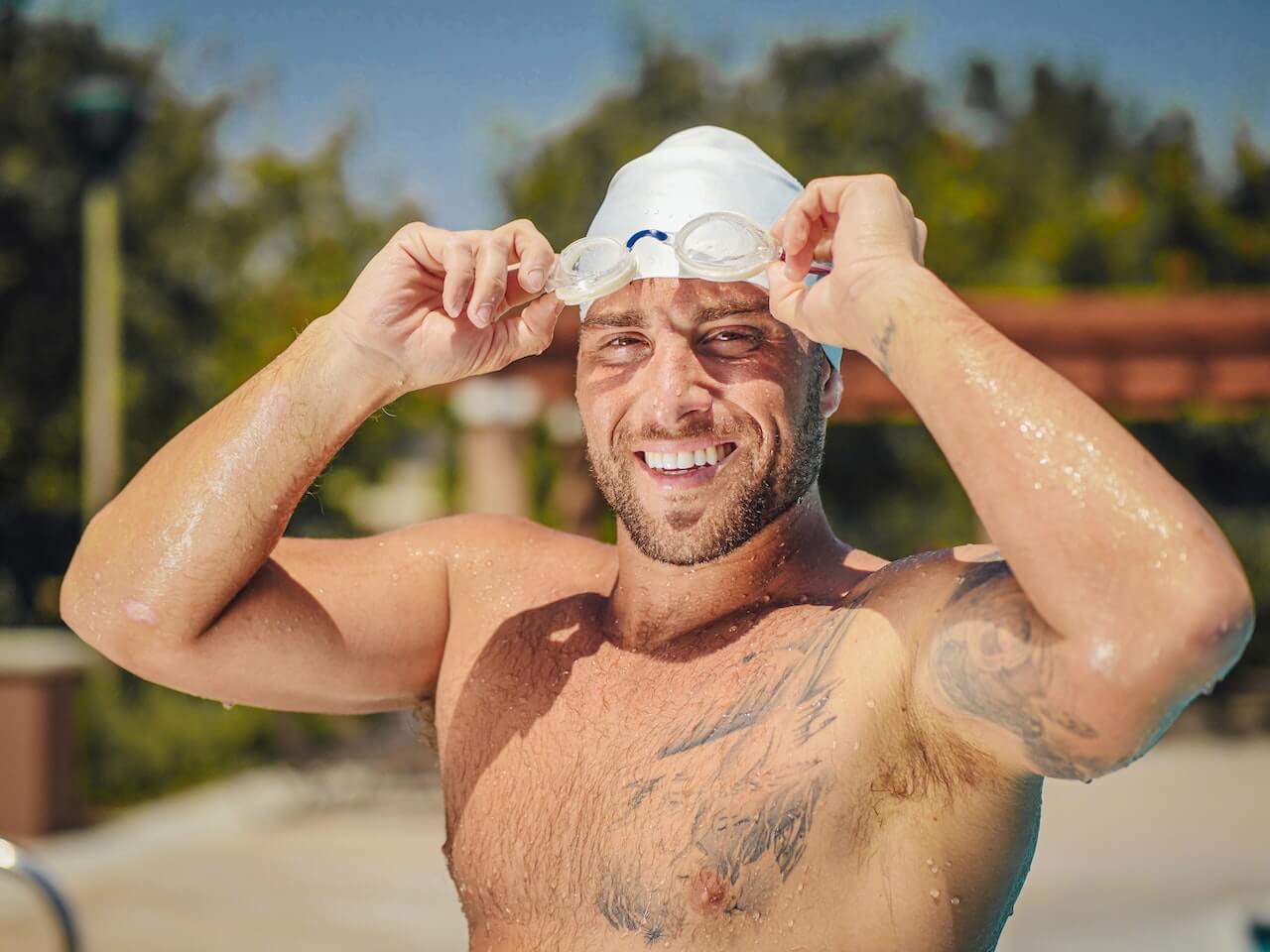Maybe you’re a swimmer or it’s just hot out, and you feel the urge to take a dip at your local pool. Only one problem remains, which is that you got a new tattoo not that long ago. Can you swim in chlorine after getting a tattoo?

No, you should not swim in chlorine after getting a tattoo. The chlorine in pool water can dry out the skin, disrupting the healing process of a fresh tattoo, and lead to fading, discomfort, or an infection. While chlorine can kill many germs, it’s not foolproof, posing an infection risk to your new tattoo, which is essentially an open wound.
In this article, we’ll take a deep dive into whether it’s safe to swim in chlorine after getting a tattoo.
A Brief Guide to the Tattoo Healing Process
What Happens After You Get Inked?
So, you’ve just left the tattoo parlor, sporting your new ink. What happens next?
Tattooing involves creating a permanent design on your skin by using needles to insert ink into the dermis—the second layer of your skin. This process, while creating beautiful body art, effectively leaves you with an open wound that you should keep sterile.
The immediate aftercare for a tattoo usually involves cleaning it gently, applying a light layer of petroleum jelly or a specialist tattoo aftercare cream, and covering it with a bandage. The tattooed area will be tender and possibly swollen for a few days.
After the initial few days, your tattoo enters what is often referred to as the ‘peeling’ stage. During this phase, the skin over your tattoo begins to peel off (much like a sunburn), revealing a bright, shiny layer of skin underneath.
The Timeline of Tattoo Healing
Healing a tattoo is a journey that typically spans several weeks:
- Week 1: The immediate aftermath of getting a tattoo is a sensitive time. Your new ink is essentially an open wound. It’s normal to see some redness, swelling, and even a little bleeding.
- Week 2-3: Now, you’re in the peeling and itching stage. Your skin is regenerating, and this may cause it to feel tight and itchy. Resist the urge to scratch!
- Week 4 and beyond: If you’ve taken good care of your tattoo, by this point, your skin should be fully healed. Keep in mind, though, everyone’s healing process is different, and larger tattoos may take longer to fully heal.
Now, how does swimming, especially in chlorinated water, fit into this picture? Let’s take a look.
Chlorinated Water and Your Skin

The Chemistry of Chlorine
So, how does chlorine affect tattoos? To better understand that, you need to first know what chlorine is and what it does.
Chlorine is widely used in swimming pools and is the chemical superhero that keeps harmful bacteria and viruses at bay, ensuring the water is safe for swimmers.
By the sound of that, it almost sounds like chlorine is something you want to expose your tattoo to since it kills bacteria and viruses, but that couldn’t be further from the truth.
While chlorine is essential for pool sanitation, it interacts with our skin in certain ways that are less than ideal.
Chlorine can strip natural oils from your skin, leading to dryness, tightness, and sometimes, irritation.
Plus, chlorine doesn’t kill all the bacteria and viruses right away. It takes time, some much longer than others, so don’t think that pool water is bacteria and virus-free just because it is chlorinated.
Effects of Chlorine on Fresh Tattoos
You might be thinking, “Dry skin? That doesn’t sound so bad.” However, for a fresh tattoo, the stakes are higher. Here’s why:
- Drying effect of chlorine: Dryness is a common enemy of new tattoos. It can interfere with your tattoo’s healing process, leading to flakiness, cracks, and ultimately, a dull-looking tattoo.
- Risks associated with color loss: Chlorine is a bleaching agent. Prolonged exposure could potentially lead to tattoo color fading.
- The threat of infection: The most serious risk of swimming with a new tattoo is infection. Remember, a fresh tattoo is an open wound. Chlorinated water isn’t a surefire way to protect your tattoo from harmful bacteria that could lead to an infection.
Can You Swim After Getting a Tattoo?

The Risks
Despite the temptation of a refreshing dip in the pool, swimming after getting a tattoo is generally not recommended. The risks simply outweigh the temporary relief from the heat:
- Infection: As mentioned earlier, a new tattoo is essentially an open wound. Immersing it in water, particularly public swimming pools, can expose it to bacteria and lead to an infection. While chlorine can kill many germs, it’s not 100% effective, and certain bacteria thrive in these environments.
- Fading: Chlorine is a bleaching agent. Hence, exposure to chlorinated water can result in the colors of your fresh tattoo fading, and it might not look as vibrant as it should.
What Do the Experts Think?
Leading tattoo artists and dermatologists often advise their clients to avoid swimming while their new tattoo is healing. According to them, the best way to care for your fresh tattoo is to keep it clean, moisturized, and away from potential irritants – such as saltwater, lake water, and yes, even chlorinated water.
Frequently Asked Questions
How long after getting a tattoo should you wait before swimming?
The consensus among professionals is to wait at least 2-4 weeks before swimming in a pool, with some recommending even up to 6-8 weeks for larger, more detailed tattoos. However, everyone heals at different rates, so these are just guidelines. Always consult with your tattoo artist or dermatologist to get personalized advice. This applies to hot tubs as well.
Can I cover my tattoo with waterproof bandages while swimming?
While it’s better than swimming unprotected, not all bandages are fully waterproof. There’s still a risk of water seeping in and causing damage. In other words, you cannot rely on waterproof bandages to keep bacteria in the water away from your tattoo.
Will a quick dip in the pool really harm your tattoo?
Yes, even a quick dip can be harmful. Your tattoo starts absorbing water—and potential contaminants—as soon as it comes in contact with it. It’s best to avoid any kind of immersion until your tattoo is fully healed.
Can you swim in saltwater or freshwater right after a tattoo?
You might think that swimming in the ocean or a lake would be less damaging to your tattoo than a chlorinated pool. Unfortunately, this isn’t the case. Natural bodies of water contain many organisms and bacteria that could lead to an infection. Salt water, in particular, can also be drying to the skin, and filled with even more bacteria, none of which are ideal for a healing tattoo.
Can you shower after getting a tattoo?
Yes, you can (and should) shower with a new tattoo, as cleanliness is crucial. Just wait 4-5 hours after getting the tattoo before showering. Use a mild, fragrance-free soap and lukewarm water to gently wash away any oozed ink or plasma. Pat dry with a clean towel and apply a thin layer of a recommended moisturizing lotion. Avoid products with heavy fragrances or alcohol, as these can irritate the skin and delay healing.
What if my tattoo accidentally gets wet?
Don’t panic! Pat it dry gently with a clean towel, and avoid rubbing the area. If your tattoo gets soaked and you’re worried about an infection, contact your tattoo artist for advice.
Sources:

